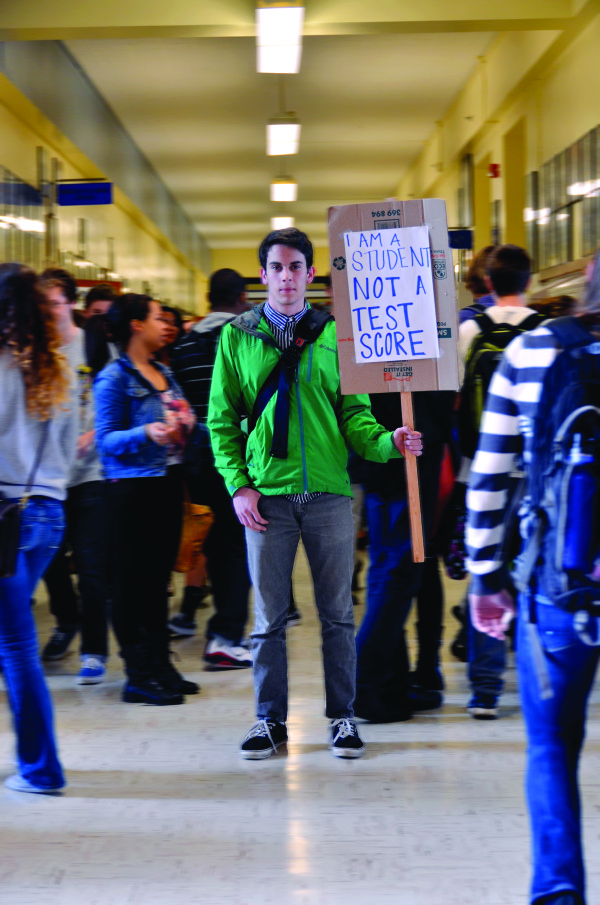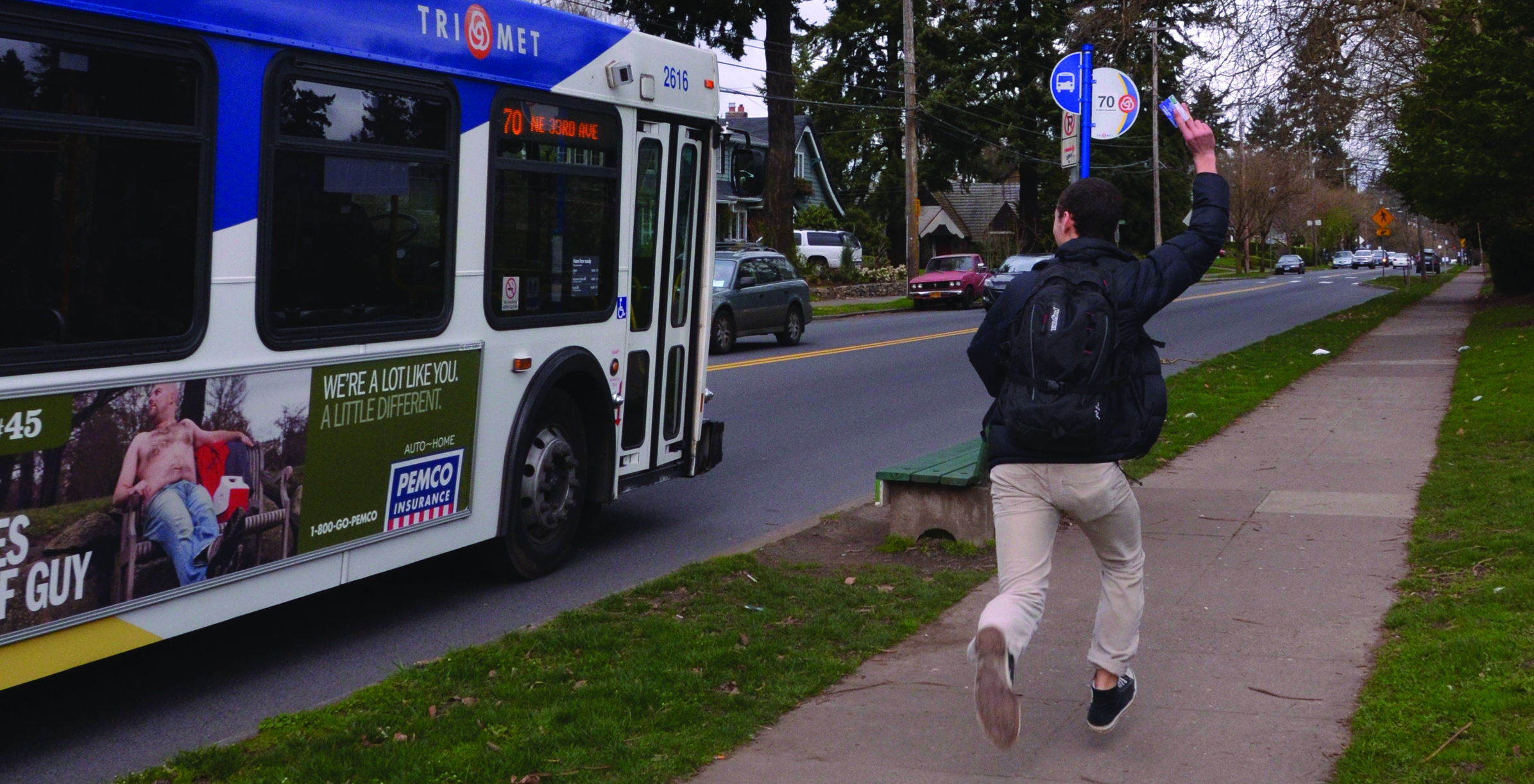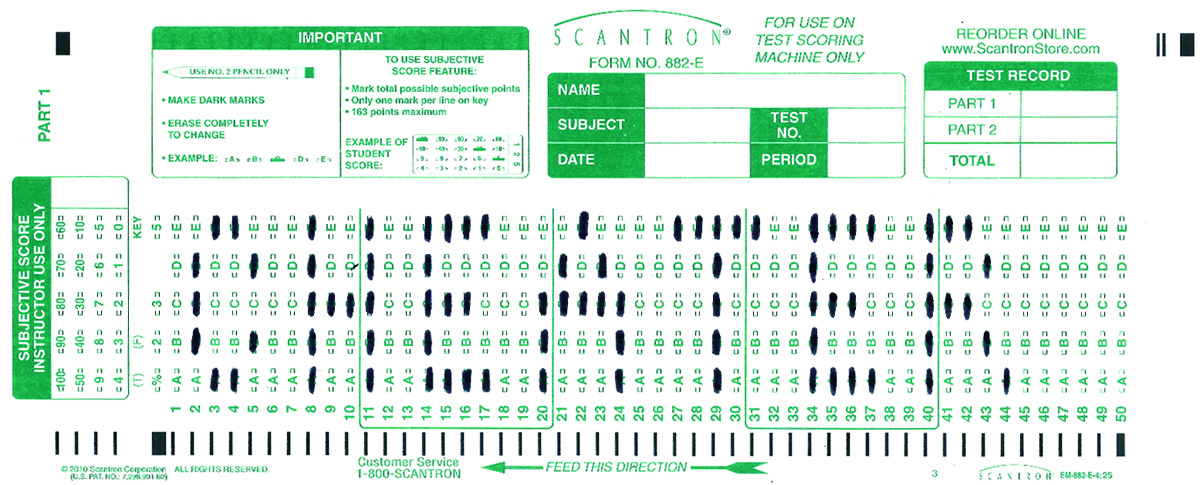
A broken radiator hums as 20 Grant High School students absently click in answers on outdated computers. The students have been herded into one of Grant’s basement computer labs to take their Oregon Assessment of Knowledge and Skills test, or OAKS.
Once they are done with the test, a number appears on their screen. That’s the only feedback students and teachers will receive. If a student has passed, they will likely never hear of the test again. If they’ve failed, they will be pulled out of class until they can score high enough.
Portland Public Schools students take OAKS tests almost every year starting in third grade. Similar assessments are given nationwide, administered by state education departments. But there is a growing movement across the country in which educators, students and parents are saying no to standardized testing.
“I just don’t believe in standardized testing as an accurate way of testing my knowledge,” says Grant junior Caleb Gumanow, who is refusing to take upcoming OAKS tests. Gumanow protested last month by walking down the halls holding a sign that said: “I am a student, not a test score.”
Gumanow attended Winterhaven Elementary School, excelling at math and science. He says this is why he has high expectations for his education. He feels strongly about educational standards but doesn’t think OAKS provides relevant ones.
Gumanow’s stepdad, Alan Moore, eagerly signed the opt-out form. Moore feels there is a place for some kind of standardized testing in schools, but in recent years, the use of high stakes tests “has gone beyond its proper role in education.”
Mickey Garrison, the director of data literacy at the Oregon Department of Education, defends standardized testing and says its purpose is to “help district leaders see if programs are effective.” It helps make sure schools across the state are held to the same standards. She says it’s a necessary part of our education system.
The Grant Student Union argues that standardized testing doesn’t accurately depict student ability, and it squanders money and valuable class time. Both, they say, are resources we can’t afford to waste. The union started the “Opt-Out” campaign to raise awareness about students’ choice to refuse to take the OAKS tests.
Movements such as this represent the most recent development in a greater testing debate. Grant Principal Vivian Orlen says the anti-testing movement has been around for decades, but Opt-Out is pushing the envelope in Portland. “They’ve opened up Pandora’s box around testing,” she says. “The pot’s getting stirred.”
 With Opt-Out, some are beginning to question if standardized tests like OAKS can truly assess the skills that will be relevant for the 21st century. Student Union members say skills such as problem solving, critical thinking and innovation cannot be tested with the current system. One possible solution is creating better standardized tests.
With Opt-Out, some are beginning to question if standardized tests like OAKS can truly assess the skills that will be relevant for the 21st century. Student Union members say skills such as problem solving, critical thinking and innovation cannot be tested with the current system. One possible solution is creating better standardized tests.
For the class of 2016, OAKS tests will be discontinued and replaced with a new test called the Smarter Balanced Assessment Consortium. This test is aligned with what are called the “Common Core State Standards,” which are being implemented across the country.
According to the Common Core mission statement, the requirements aim to pinpoint the “knowledge and skills that our young people need for success in college and careers.”
Orlen sees improvements in the new test. Common Core includes much more writing and more opportunities to show critical thinking, and it assesses students’ ability to make connections between ideas. In contrast, Orlen says the old model is geared toward “regurgitating information.”
Some teachers question whether the new system is more than simply a new breed of ineffective tests, complaining that they aren’t directly created by educators but by politically driven third parties. Garrison admits that the decision to create new standards was “made by governors and superintendents nationwide.”
Science teacher Amy Lindahl describes standardized testing as merely a way to gather superficial information – a “quick fix solution.”
Chemistry teacher Bill Wilson finds many flaws in the system as well. He sees students who haven’t yet passed their OAKS test in any subject getting pulled out of class frequently to retake the test. This causes them to lose vital learning time and as a result fall further behind in a subject with which they are already struggling.
Wilson has chosen to opt-out his own son from OAKS next year when he goes into the third grade. “I would like my son’s teachers to not teach to a test,” he says, arguing that standardized testing makes it difficult for instructors to be creative with their curriculum.
The developers of the Common Core standards argue that the tests will help improve the public school system that is making us fall behind in today’s global economy. They point to the United States’ low score on the PISA, an international assessment that compares developed nations. Finland is ranked #1 in all three categories tested: reading, math and science.
Ironically, Finland didn’t get there via standardized testing. In fact, tests like the OAKS run counter to how Finland made it to the top. In the 1970s, Finland made a change in its public education system. The country wanted to create a system where family background and income, factors highly correlated with standardized test scores, wouldn’t hold students back.
Instead of a competitive bell curve model in which a certain percentage of students can’t win, Finland implemented a system that tests less and trusts teachers more. Although the country wasn’t intending to climb to the top of the PISA list when it started, four decades later Finnish youth excel in every category.
In New York City, Orlen was a founding teacher at a school that operated on the same idea of teacher and student trust. Instead of standardized testing, the school used a portfolio system that engaged students and held them accountable to their learning. It was a system that “allowed different kinds of learners to demonstrate their learning in different ways,” Orlen says. According to her, this method cost almost nothing but teacher’s time.
Sparking publicity around the issue of standardized testing this January, teachers and students at Garfield High School in Seattle united to boycott the Measures of Academic Progress, or MAP test. Much like Oregon’s OAKS, the MAP assesses students on general skills like science, reading and math. Many agreed it didn’t represent student ability well enough.
After a unanimous staff vote and broad support from the community, teachers at Garfield refused to administer the MAP when testing day came. Students joined the uprising and protested on campus and also at the school district office. More than three quarters of the student body decided to “Scrap the MAP.”
Jesse Hagopian, a history teacher at Garfield, was a key player in the boycott and argues that the MAP, along with other standardized tests, put low-income kids at a disadvantage. “What these tests measure is your access to resources,” says Hagopian. “The thing they don’t really measure is intelligence.”
 Texas also came to the forefront of the growing conversation on testing this year. In their 2014-15 budget, funding for standardized tests was altogether eliminated by the House of Representatives. Now, the fight against standardized testing has reached Portland.
Texas also came to the forefront of the growing conversation on testing this year. In their 2014-15 budget, funding for standardized tests was altogether eliminated by the House of Representatives. Now, the fight against standardized testing has reached Portland.
The Grant Student Union, part of the greater Portland Student Union, spearheaded the Opt-Out movement. Senior Morgan Grover got involved because she feels the tests take time away from the classroom and create intense test pressure for children, “making them view themselves as a test score.” She says she has severe test anxiety herself.
At the end of the school year, if enough students boycott the OAKS test, Grant will automatically maintain a “needs improvement” grade from the state to create a political statement.
English teacher Therese Cooper is in charge of making sure that doesn’t happen. She has to ensure that at least 95 percent of the student body participates in the testing so that we don’t receive the “needs improvement” label the school has had for the last two years. Cooper is concerned about the Opt-Out campaign. If Grant doesn’t meet, she says, “it creates a very big mess.”
If a school continually fails these federal requirements, it may be subject to intervention by the Department of Education. Cooper says this could create a “bureaucratic nightmare” and constrain teachers’ ability to teach creatively.
The goal of Opt-Out, says Grover, is to send a strong message to the district that we shouldn’t be using OAKS testing to evaluate students, teachers and schools. If other PPS schools follow suit, the student union hopes that the community and public officials won’t be able to ignore the stated issues with our testing system.
Junior Dylan Wright was one of the first Grant students to opt out. He is choosing not to take the upcoming OAKS science test because he feels this portion especially is a bad representation of his academic ability.
Orlen agrees. “The science one to me is a little bit like Trivial Pursuit,” she says.
Wright’s mother supports his decision to opt out of the OAKS test. “It’s the appropriate way to protest something like this,” she says.
The campaign has gained support from Representative Lew Frederick, who serves in the Oregon State Legislature representing North and Northeast Portland. Last month, he testified in front of the House Education Committee, encouraging a reevaluation of the way students are tested.
“What will members of the current generation of school children be doing when they reach their 20s and 30s?” he asked. “Will they be a part of an economy of innovation, or at the mercy of an economy driven by innovators elsewhere in the world?”
Switching to another system wouldn’t be quick or easy. “It takes people to do this,” says Frederick, stressing it would take a large number of people backing the campaign.
For now, Frederick is pushing House Bill 2664, which calls for a reevaluation of the use of standardized tests in public schools. If the bill passes, he says it would send “some folks scrambling to justify something things that they haven’t had to justify in the past.”
Everyone has a different idea of what the perfect system for evaluation should be. Orlen isn’t sure. She recognizes that while they are not ideal, standardized tests provide “greater coherence” across a district, state and nation. Whatever form it may take, Orlen sees the ultimate solution as one that helps with “preparing students for the next phase of their lives.”
Orlen supports Opt-Out, saying it is important and positive because it raises good questions. She sees the campaign as the first wave of a movement in Portland. “I do think they’ve started something,” she says. “Where it will go, time will tell.”




